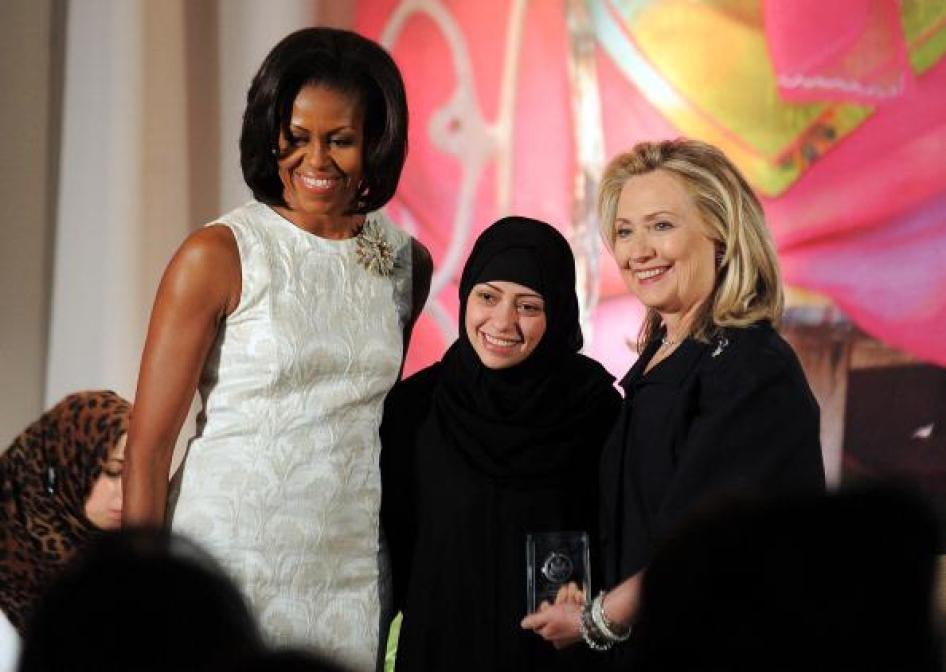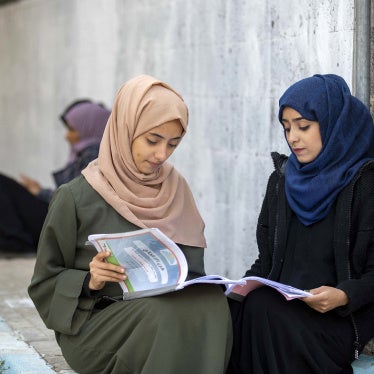(Beirut) – Saudi authorities have arrested the internationally recognized women’s rights activist Samar Badawi and an Eastern Province activist, Nassima al-Sadah, in the past two days, Human Rights Watch said today. Badawi and al-Sadah are the latest victims of an unprecedented government crackdown on the women’s rights movement that began on May 15, 2018 and has resulted in the arrest of more than a dozen activists.
Badawi, a recipient of the United States’ 2012 International Women of Courage Award, is best known for challenging Saudi Arabia’s discriminatory male guardianship system. She was one of the first women to petition Saudi authorities to allow women the right to drive as well as the right to vote and run in municipal elections. Al-Sadah, from the coastal city of Qatif, has also long campaigned both for abolishing the guardianship system and lifting the driving ban. She was a candidate in the 2015 local elections, the first time women were allowed to run, but the authorities removed her name from the ballot, ultimately barring her from running.
“The arrests of Samar Badawi and Nassima al-Sadah signal that the Saudi authorities see any peaceful dissent, whether past or present, as a threat to their autocratic rule,” said Sarah Leah Whitson, Middle East director at Human Rights Watch. “After the recent arbitrary arrests of businesspeople, women’s rights activists, and reformist clerics, Saudi Arabia’s allies and partners should question what ‘reform’ really means in a country where the rule of law is disdainfully ignored.”
Saudi authorities, under the ultimate direction of Crown Prince Mohammad bin Salman, have stepped up arrests and prosecutions of dissidents and activists since early 2017. As the arrests escalated, Badawi and al-Sadah, like the other women’s rights activists recently arrested, had largely gone quiet in their social media and other public advocacy.
Saudi authorities have targeted and harassed Badawi for years. In addition to her advocacy for women’s equality, she has campaigned energetically for both her former husband and her brother to be released from prison. Waleed Abu al-Khair, her former husband, is serving a 15-year sentence for his human rights work, and Raif Badawi, her brother, is a blogger serving a 10-year sentence for expressing controversial opinions online. In December 2014, Saudi authorities barred her from travelling abroad and in January 2016, they briefly detained her over her peaceful human rights advocacy.
On July 30, authorities also arrested Amal al-Harbi, wife of the leading Saudi activist Fowzan al-Harbi. He is serving a seven-year sentence for his work with the now-banned Saudi Civil and Political Rights Association (ACPRA), one of the country’s first civic organizations. It is unclear why Saudi authorities have targeted Al-Harbi.
The recent crackdown on women's rights activists began just weeks ahead of the much-anticipated lifting of the driving ban on women on June 24, a cause for which many of the detained activists had campaigned. While some have been released, others remain detained without charge. They include Loujain al-Hathloul, Aziza al-Yousef, Eman al-Nafjan, Nouf Abdelaziz, Mayaa al-Zahrani, and Hatoon al-Fassi, all women’s rights activists, as well as supporters of the movement, including Ibrahim al-Modaimeegh, a lawyer; Abdulaziz Meshaal, a philanthropist; and Mohammed Rabea, a social activist.
Authorities accused several of those detained of serious crimes, including “suspicious contact with foreign parties” under thin legal pretenses. Government-aligned media outlets have carried out an alarming campaign against them, branding them “traitors.” The Saudi newspaper Okaz reported that nine of those detained will be referred for trial to the Specialized Criminal Court, originally established to try detainees held in connection with terrorism offenses. If convicted, they could face up to 20 years in prison.
Dr. al-Fassi, a renowned scholar and associate professor of women’s history at King Saud University, was one of the first women to acquire a Saudi driver’s license. Saudi authorities arrested her just days before lifting the ban. Numerous other women’s rights activists have since been placed under travel bans.
Saudi women’s rights activists have not only petitioned successive government authorities to reform discriminatory laws and policies, but also sought to change societal attitudes. While the government has recently introduced limited reforms, including allowing women to enter some professions previously closed to them as well as lifting the driving ban, the male guardianship system, the main impediment to the realization of women’s rights, remains largely intact.
Under this system, women must obtain permission from a male guardian – a father, brother, husband, or even a son – to travel abroad, obtain a passport, enroll in higher education, get a life-saving abortion, be released from a prison or shelter, or marry.
“Allies and partners considering opportunities for closer ties with Saudi Arabia during this period of ‘reform’ should speak out against Mohammad bin Salman’s ultimately self-defeating repression. Any economic vision that seeks to open up Saudi Arabia while throwing real reformers in jail may well end badly for everyone,” said Whitson.









